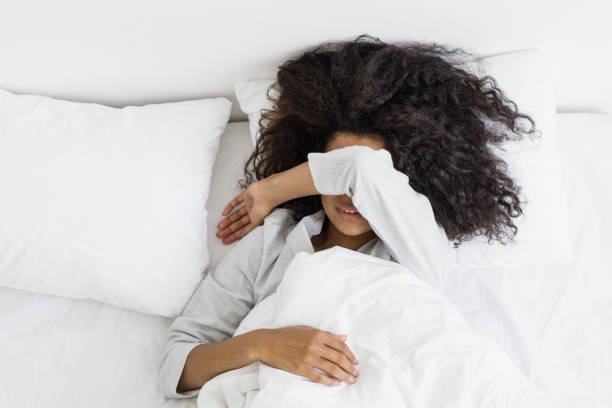7 Reasons Why You Can’t Sleep

Are you suffering from insomnia? Do you find yourself tossing and turning at night trying to fall asleep? Or perhaps you fall asleep easily only to wake up hours before your alarm is set to go off. Whether you experience a sleepless night occasionally or almost every night, it is not normal. Sleep is one of the most important factors in living a healthy lifestyle. Without adequate sleep each night, your overall health and well-being become jeopardized….CONTINUE READING
Lack of sleep may contribute to your inability to concentrate and even make important decisions. Sleep, diet, and exercise are the basic foundation for a healthy lifestyle. You should aim to sleep at least 7 hours a night along with eating a nutritious diet and performing moderate exercise daily.
Getting a good night’s sleep may be easier said than done. I have spent many years dealing with sleep disorders, which have negatively impacted my everyday activities and work. I have spent a lot of time trying to find solutions for my insomnia and have finally found what works best for me. Before I was able to come up with the solutions that helped me sleep better, I decided to look at the underlying problems.
Here are the top seven reasons why you can’t sleep and how to fix them.
1. Stress
I can’t tell you how many times I have stayed up late at night thinking about all the things I had to do the next day. Sometimes this leads me to think about all the things I have to do three weeks or even months from today. I find myself stressing out about things that I cannot deal with at that moment. Stress and worry are something I’m sure you deal with daily. However, you need to find ways to manage and cope with stress so that you do not spend your nights overthinking.
If I find myself stressed out at night, the first thing I do is take a deep breath. Next, if I can’t seem to stop my thoughts, I start writing. Whether I write a to-do list or just jot down a few thoughts, I can vent to myself and think a little more clearly. If I still feel overwhelmed, I take another deep breath, close my eyes, and attempt to meditate. Meditating can help clear your headspace and make you feel more at ease.
2. Lack of exercise
Exercise is not something I have always been a fan of. Although I have always been active, exercise was not always a top priority for me. I played sports growing up and throughout high school. However, when I attended college, the only exercise I participated in was walking from the library to the nearest bar. I would occasionally tag along with a friend and go on the elliptical for an hour. But other than that, I never realized the benefits of exercise like this study suggests. Now that I work full time and engage in a regular exercise routine, I finally understand the positive effects physical activity has on my sleep at night. I truly notice a difference in my sleeping habits when I go a day or two without exercise. Whether you go for a long walk, a quick jog, or take a yoga class, being active during that day can help you sleep better at night.
3. Caffeine overload
Coffee or tea in the morning is a must for many people. Occasionally, an afternoon pick-me-up may be necessary, too. However, drinking too much caffeine throughout the day or too close to bedtime may be keeping you up at night. I used to love drinking a cup of tea or coffee after work to help hold me over before dinner until I figured out this was contributing to my nights of insomnia. Instead, I tried decaf tea and a handful of fruit to replace my afternoon caffeine fix, and surprisingly this helped significantly. I no longer felt restless at night and was more relaxed at bedtime. If you feel like your day is dragging and you cannot go another second without a cup of coffee, try reaching for water instead. Sometimes you are dehydrated and sipping water can help give you that energy boost you’re craving.
4. Noise
Too little or too much noise can also interfere with your sleep. I personally need white noise to block out any outside noises. When I am first falling asleep, even just footsteps can keep me awake as well as karaoke night at the bar next to my apartment building every Tuesday night. This is why I must have a fan on at nighttime. Once I fall asleep, I typically can sleep through anything as long as a fan is on in my bedroom. Any time I am in a new place where there is no fan or noise machine, I have difficulty falling asleep. In this case, I will download a sound machine app on my phone. I recommend turning on a fan or sound machine to anyone who has a sleep disorder to get the best quality of sleep each night.
5. Light exposure
Watching television, playing on your phone, and even digital clocks may be another surprising reason why you can’t sleep at night. Studies have shown that these types of lights interfere with signals in your brain telling your body it is time to shut down and go to sleep. I am guilty of scrolling through social media on my cell phone in bed before going to bed and even leaving the TV on from time to time. However, in the evenings I am exposed to these bright lights, I find that I have more difficulty falling asleep. Try setting a cut-off time for all electronics 30 minutes before bedtime. Instead, try meditating, journaling, or reading a book to reduce the amount of brightness you are getting at night.
6. Irregular sleep schedule
Sometimes there are nights you seem to be restless for no apparent reason. Perhaps you have used all of the above suggestions, but are still tossing and turning. You may not feel stressed or even anxious but still can’t seem to fall asleep anyway. If this is the case, you may need to evaluate your activity that day. Try to avoid naps if possible in the afternoon. Sometimes a power nap is necessary to re-energize before a workout or dinner date. However, anything more than 20 minutes could interfere with your sleeping patterns. You should also try to stick to the same sleep schedule each night, especially during the week. Although life tends to happen and you may find yourself staying at happy hour a few hours longer than expected, try to go to bed and wake up at the same time each day. Maintaining a consistent sleep schedule is a smart move.
7. Uncomfortable bedroom environment
Your bedroom should be your (and your partner’s) own private sanctuary where you feel safe and at ease each night. I have lived in many places over the past 10 years after leaving my childhood home. I have lived in dorm rooms, off-campus housing, summer beach houses, and a few different apartments. Although all of these places were very different from one another, I always managed to make my bedroom feel comfortable. At nighttime, I choose to keep the temperature cool. There’s nothing worse than waking up in a pile of sweat at nighttime. I love snuggling into my blankets and feeling a slight breeze. I also try to keep my bedroom dark. If you do not have the proper blinds in your bedroom, try black-out curtains. I also wear an eye mask at night to keep the light out. Lastly, try to keep your bedroom organized. Reducing clutter can help to keep you relaxed and feel more at peace before going to bed.




